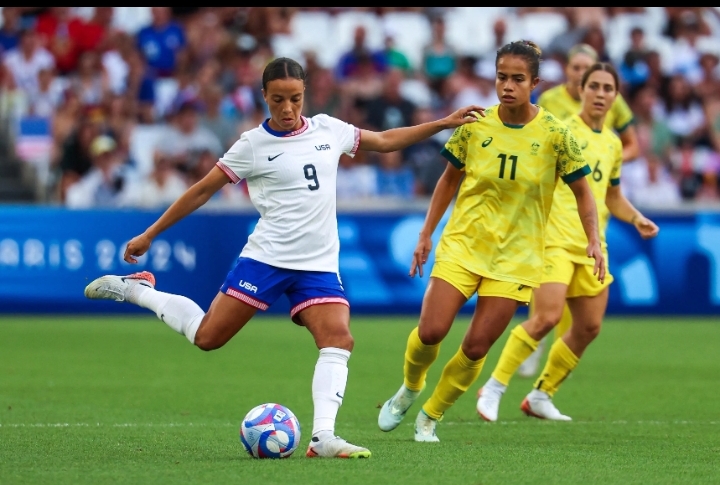NFL
How Olympian Cindy Parlow Cone Is Transforming U.S. Soccer

As all eyes are on the Paris Olympic Games and the U.S. soccer teams compete for glory on the pitch, Cindy Parlow Cone is leading a different kind of victory from the sidelines. A two-time Olympic gold medalist turned first female president of U.S. Soccer, Cone has traded her cleats for the boardroom, emerging as a driving force behind the organization’s most significant evolution in decades.
Cone’s journey from the pitch to the presidency is as remarkable as it is unique. The youngest woman to win both an Olympic gold medal and a World Cup with the iconic 1999 team, she now stands as one of only seven women leading FIFA’s 211 member associations, bringing a rare perspective to the sport’s global governance.
In 2020, Cone unexpectedly stepped into the U.S. Soccer presidency amid a contentious equal pay lawsuit filed by the Women’s National Team. For her, this wasn’t merely a legal challenge but a deeply personal mission. “I’ve been in the equal pay fight for two decades now,” she reflected in our recent interview, her words spanning her evolution from player to executive.
The transition came with its share of doubts. “I thought about all the things I wasn’t, that I hadn’t done that most people would expect,” Cone admits. Yet she soon recognized that her athletic experience was her most valuable asset. “I know how to build a team, empower people, lead, and follow.”
As all eyes are on the Paris Olympic Games and the U.S. soccer teams compete for glory on the pitch, Cindy Parlow Cone is leading a different kind of victory from the sidelines. A two-time Olympic gold medalist turned first female president of U.S. Soccer, Cone has traded her cleats for the boardroom, emerging as a driving force behind the organization’s most significant evolution in decades.
Cone’s journey from the pitch to the presidency is as remarkable as it is unique. The youngest woman to win both an Olympic gold medal and a World Cup with the iconic 1999 team, she now stands as one of only seven women leading FIFA’s 211 member associations, bringing a rare perspective to the sport’s global governance.
In 2020, Cone unexpectedly stepped into the U.S. Soccer presidency amid a contentious equal pay lawsuit filed by the Women’s National Team. For her, this wasn’t merely a legal challenge but a deeply personal mission. “I’ve been in the equal pay fight for two decades now,” she reflected in our recent interview, her words spanning her evolution from player to executive.
The transition came with its share of doubts. “I thought about all the things I wasn’t, that I hadn’t done that most people would expect,” Cone admits. Yet she soon recognized that her athletic experience was her most valuable asset. “I know how to build a team, empower people, lead, and follow.”
U.S. Soccer Annual General Meeting
Cindy Parlow Cone speaks during the 2024 U.S. Soccer National Council Meeting (Photo by Omar Vega/USSF/Getty Images for USSF)GETTY IMAGES FOR USSF
Cone’s tenure has been defined by groundbreaking achievements, none more impactful than the landmark equal pay agreement she brokered in 2022. This deal addressed years of dispute over the significant pay gap between men’s and women’s national teams despite the women’s superior performance on the world stage. Beyond salary equalization, it took the unprecedented step of pooling FIFA World Cup prize money between men’s and women’s teams—a revolutionary move in a sport where men’s tournaments have historically commanded far larger purses.
It took me two years,” Cone says of the negotiations. “Everyone told me that this couldn’t happen.” Her perseverance in the face of skepticism exemplifies a critical lesson: transformative change often demands challenging the status quo.
The agreement’s impact resonates beyond U.S. Soccer, offering a model for other sports federations wrestling with gender pay gaps. It reframes the conversation from one of fairness to one of strategic advantage. “If you invest in women’s sports, it’s good ROI,” Cone argues, confronting long-standing assumptions about the marketability of women’s athletics.
Cone views this not as a passing phenomenon but as a fundamental shift. “This isn’t a moment like ’99,” she says, referencing the 1999 World Cup that many saw as women’s soccer’s watershed. “This is transformative change that’s here to stay.” Her perspective is informed by the stark contrast to her early career when opportunities were far more limited.
As U.S. Soccer prepares to co-host the 2026 Men’s World Cup and bids for the 2031 Women’s World Cup, Cone’s vision encompasses more than these marquee events. She advocates for investment across all levels, from grassroots programs to professional leagues, recognizing that sustainable growth demands a comprehensive approach.
This holistic outlook shapes Cone’s leadership style, prioritizing diverse perspectives and collaborative problem-solving. “I don’t want [new hires] to be a culture fit,” she explains. “I want them to be a culture add.” This philosophy is proving effective in navigating the complex landscape of international soccer politics and domestic sports governance, establishing a new leadership paradigm.
Cone’s impact reverberates far beyond the soccer pitch. By leveraging her unique experiences as both player and president, she’s driving tangible change, setting a new standard for sports leadership in the process.
Watch more interviews in the Power Women Profiles series here.











